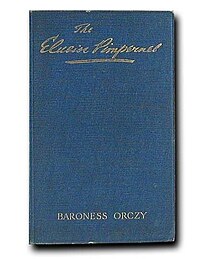Plot summary
It is September 1793 and French Agent and chief spy-catcher Chauvelin is determined to get his revenge for the previous humiliations dished out to him at the hands of the Scarlet Pimpernel.
Chauvelin travels to England as an official representative of the French government tasked with looking after the interests of French citizens, but this is only a cover and his real purpose is to trick Sir Percy Blakeney into returning to France, where he can be captured and put to the guillotine.
The plot is hatched at a gala on Richmond Green, with the help of a young French actress, Désirée Candeille, whom Chauvelin has enlisted with promises of money, pardon and fame if she succeeds.
Désirée is manning a tent with a model guillotine under the premise of raising money for the poor of Paris. Marguerite Blakeney enters her stall and starts talking to Désirée. On discovering her to be a fellow French actress, she is soon taken in by the young woman's sob story and before long had invited her to perform at her house in Richmond in front of the Prince of Wales.
Once the offer has been made and accepted, Désirée's official chaperone is revealed as Chauvelin. Marguerite realises she's been set up, but the offer has been made and Sir Percy insists that both of them should come to his house as arranged.
Juliette de Marny (whose rescue by the Scarlet Pimpernel is told in the novel I Will Repay ), is staying with them at Blakeney Manor. Chauvelin has managed to get his hands on her family jewels (which were being looked after by the local priest) and has given a diamond necklace, which belonged to Juliette's mother, to Désirée Candeille.
When Désirée turns up at the Blakeney's Richmond mansion wearing the jewels there is a bitter argument between the women. Désirée manages to engineer the situation so that Sir Percy must fight Chauvelin in a duel to avenge the insults levied against her—for which they must go to France, as duelling is outlawed in England.
The following morning Percy leaves Marguerite behind in Richmond and heads for Boulogne. Chauvelin has no intentions of actually fighting the Englishman, but to ensure the Pimpernel cannot escape before he can be captured, Chauvelin sets a further trap for Marguerite who falls for it completely. Before long she has been arrested for attempting to enter France on a false passport, given to her by an apparently apologetic Désirée Candeille, as part of Chauvelin's plot.
With Marguerite in prison and the citizens of Boulogne threatened with death if she escapes, Chauvelin appears to have an air-tight plan to secure and discredit Sir Percy that will end the meddling of the Scarlet Pimpernel for good... but as always Percy is more than a match for his arch-enemy.

The Scarlet Pimpernel is the first novel in a series of historical fiction by Baroness Orczy, published in 1905. It was written after her stage play of the same title enjoyed a long run in London, having opened in Nottingham in 1903.

Baroness Emma Orczy, usually known as Baroness Orczy or to her family and friends as Emmuska Orczy, was a Hungarian-born British novelist and playwright. She is best known for her series of novels featuring the Scarlet Pimpernel, the alter ego of Sir Percy Blakeney, a wealthy English fop who turns into a quick-thinking escape artist in order to save French aristocrats from "Madame Guillotine" during the French Revolution, establishing the "hero with a secret identity" in popular culture.
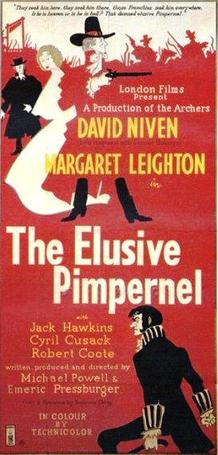
The Elusive Pimpernel is a 1950 British period adventure film by the British-based director-writer team of Michael Powell and Emeric Pressburger, based on the novel The Scarlet Pimpernel (1905) by Baroness Emmuska Orczy. It was released in the United States under the title The Fighting Pimpernel. The picture stars David Niven as Sir Percy Blakeney, Margaret Leighton as Marguerite Blakeney and features Jack Hawkins, Cyril Cusack and Robert Coote. Originally intended to be a musical, the film was re-worked as a light-hearted drama.

The Scarlet Pimpernel is a musical with music by Frank Wildhorn and lyrics & book by Nan Knighton, based on the 1905 novel of the same name by Baroness Orczy. The show is set in England and France during the Reign of Terror of the French Revolution. The story is a precursor to the spy fiction and the superhero genres, where a hero hides under a mild-mannered alias.

Don't Lose Your Head is a 1967 British swashbuckling comedy film, the 13th in the series of 31 Carry On films (1958–1992). It features regular team members Sid James, Kenneth Williams, Jim Dale, Charles Hawtrey, and Joan Sims. Set in France and England in 1789 during the French Revolution, it is a parody of Baroness Orczy's The Scarlet Pimpernel.

The Scarlet Pimpernel is a 1999 series of television drama programmes loosely based on Baroness Emmuska Orczy's series of novels, set during the French Revolution.

Eldorado, by Baroness Orczy is a sequel book to the classic adventure tale, The Scarlet Pimpernel. It was first published in 1913. The novel is notable in that it is the partial basis for most of the film treatments of the original book.
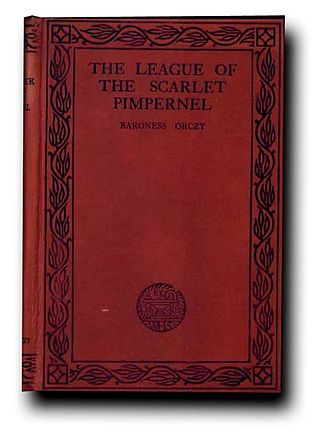
The League of the Scarlet Pimpernel is a sequel book to the classic adventure tale, The Scarlet Pimpernel. Written by Baroness Orczy and first published in 1919, the book consists of eleven short stories about Sir Percy Blakeney's exploits in rescuing various aristos and French citizens from the clutches of the guillotine.
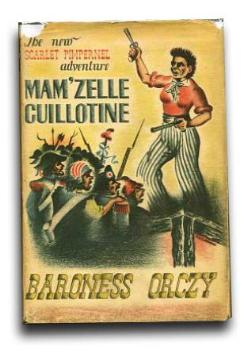
Mam'zelle Guillotine, by Baroness Orczy, is a sequel book to the classic adventure tale, The Scarlet Pimpernel. First published in 1940, it was the last novel Orczy wrote featuring the Pimpernel and is dedicated to those fighting in World War II.
"To all those who are fighting in the air, on the water and on land for our country and for our homes, I dedicate this because it is to them that we shall owe a happy issue out of all our troubles and a lasting peace." - Emmuska Orczy - Monte Carlo - 1939-40
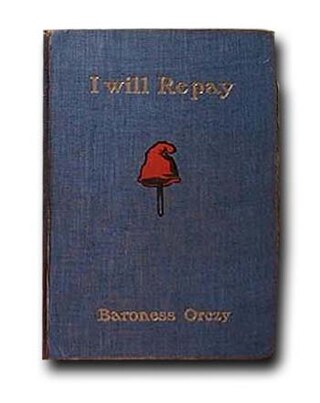
I Will Repay was written by Baroness Emmuska Orczy and originally published in 1906, this is a sequel novel to the Scarlet Pimpernel. The second Pimpernel book written by Orczy, it comes chronologically third in the series, after Sir Percy Leads the Band and before The Elusive Pimpernel.

Lord Tony's Wife, by Baroness Orczy is a sequel book to the classic adventure tale, The Scarlet Pimpernel. It was first published in 1917.

Sir Percy Hits Back is (chronologically) the ninth book in the Scarlet Pimpernel series by Baroness Orczy. It was first published in 1927.
Citizen Armand Chauvelin is the villain in Baroness Emmuska Orczy's classic novel The Scarlet Pimpernel and the various plays and films derived from the work.

The Triumph of the Scarlet Pimpernel, first published in 1922, is a book in the series about the Scarlet Pimpernel's adventures by Baroness Orczy. Again Orczy interweaves historic fact with fiction, this time through the real life figures of Thérésa Cabarrus, and Jean-Lambert Tallien; inserting the Scarlet Pimpernel as an instigator of the role Tallien played in the Thermidorian Reaction in July 1794.
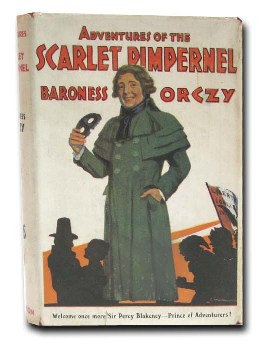
Adventures of the Scarlet Pimpernel is the second collection of short stories written by Baroness Orczy about the gallant English hero, the Scarlet Pimpernel and his League. Written in 1929 the stories, which are listed below, are set in 1793 but appear in no particular order. They occasionally refer to events in other books in the series and Orczy frequently reuses plot lines and ideas from the longer Pimpernel novels.

The Scarlet Pimpernel is a 1934 British adventure film directed by Harold Young and starring Leslie Howard, Merle Oberon, and Raymond Massey. Based on the 1905 play by Baroness Orczy and Montagu Barstow and the classic 1905 adventure novel by Orczy, the film is about an eighteenth-century English aristocrat (Howard) who leads a double life, passing himself off as an effete aristocrat while engaged in a secret effort to rescue French nobles from Robespierre's Reign of Terror. The film was produced by Alexander Korda. Howard's portrayal of the title character is often considered the definitive portrayal of the role. In 1941, he played a similar role in "'Pimpernel' Smith" but this time set in pre-WWII Germany.

The Scarlet Pimpernel is a 1982 British romantic adventure television film set during the French Revolution. It is based on the novels The Scarlet Pimpernel (1905) and Eldorado (1913) by Baroness Emmuska Orczy, and stars Anthony Andrews as Sir Percy Blakeney/the Scarlet Pimpernel, the protagonist, Jane Seymour as Marguerite St. Just, the love interest, and Ian McKellen as Chauvelin, the antagonist.

The Return of the Scarlet Pimpernel is a 1937 British film directed by Hanns Schwarz and starring Barry K. Barnes, Sophie Stewart, Margaretta Scott and James Mason. It is a sequel to the 1934 film The Scarlet Pimpernel based on the stories by Baroness Emmuska Orczy.
The Elusive Pimpernel is a 1919 British silent adventure film directed by Maurice Elvey and starring Cecil Humphreys, Marie Blanche and Norman Page. It was based on the 1908 novel The Elusive Pimpernel by Baroness Orczy.

I Will Repay is a 1923 British silent period film directed by Henry Kolker and starring Holmes Herbert, Flora le Breton, and Pedro de Cordoba. It was based on the 1906 novel I Will Repay by Emma Orczy, which is a sequel to The Scarlet Pimpernel. It was released in the United States under the alternative title Swords and the Woman.
